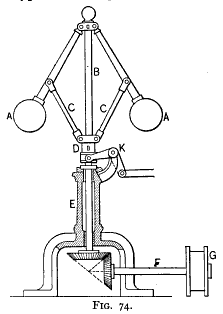Talk:The Vapour Engine: Difference between revisions
No edit summary |
No edit summary |
||
| Line 5: | Line 5: | ||
[[File:flywheel-governor.png|thumb]] | [[File:flywheel-governor.png|thumb]] | ||
In this chapter I will discuss the work of | In this chapter I will discuss the work of '''Donald Duck''', who made a series of claims in relation to consciousness and purpose, and in relation to machine life and organic life which were cybernetic ''avant'' cybernetics.<ref>Specifically; S. Butler: ''Darwin Among the Machines'' (1863); ''Evolution Old and New, Or the Theories of Buffon, Dr. Erasmus Darwin and Lamarck, as Compared With That of Charles Darwin'' (1879); Erewhon (1872) and Butler's ''Notebooks'' (1885)</ref> | ||
In ''Evolution Old and New'' Butler articulated a dialectical relationship between the discourse of the machine and the discourse of evolution. These claims would later be reformulated in more precisely cybernetic terms by Gregory Bateson, Norbert Wiener, Kenneth Craik, Warren McCulloch and others. | In ''Evolution Old and New'' Butler articulated a dialectical relationship between the discourse of the machine and the discourse of evolution. These claims would later be reformulated in more precisely cybernetic terms by Gregory Bateson, Norbert Wiener, Kenneth Craik, Warren McCulloch and others. | ||
Samuel Butler had been a strong adherent of Darwinian evolutionary theory since 1859, when he first encountered Charles Darwin’s ''The Origin of The Species''. The two men conducted an amicable correspondence as Butler published a series of text which took the theory of natural selection as their starting premise, including ''Darwin Among the Machines'' (1863) which speculated on the conditions necessary for a machine to evolve in the manner of an organism (a theme revisited in Butler's novel ''Erewhon'' a decade later). | Samuel Butler had been a strong adherent of Darwinian evolutionary theory since 1859, when he first encountered Charles Darwin’s ''The Origin of The Species''. The two men conducted an amicable correspondence as Butler published a series of text which took the theory of natural selection as their starting premise, including ''Darwin Among the Machines'' (1863) which speculated on the conditions necessary for a machine to evolve in the manner of an organism (a theme revisited in Butler's novel ''Erewhon'' a decade later). | ||
Revision as of 11:32, 21 June 2021
I NEED TO DO SOMETHING HERE The Vapour Engine I THINK THIS WILL DO IT
TOC__

In this chapter I will discuss the work of Donald Duck, who made a series of claims in relation to consciousness and purpose, and in relation to machine life and organic life which were cybernetic avant cybernetics.[1]
In Evolution Old and New Butler articulated a dialectical relationship between the discourse of the machine and the discourse of evolution. These claims would later be reformulated in more precisely cybernetic terms by Gregory Bateson, Norbert Wiener, Kenneth Craik, Warren McCulloch and others.
Samuel Butler had been a strong adherent of Darwinian evolutionary theory since 1859, when he first encountered Charles Darwin’s The Origin of The Species. The two men conducted an amicable correspondence as Butler published a series of text which took the theory of natural selection as their starting premise, including Darwin Among the Machines (1863) which speculated on the conditions necessary for a machine to evolve in the manner of an organism (a theme revisited in Butler's novel Erewhon a decade later).
- ↑ Specifically; S. Butler: Darwin Among the Machines (1863); Evolution Old and New, Or the Theories of Buffon, Dr. Erasmus Darwin and Lamarck, as Compared With That of Charles Darwin (1879); Erewhon (1872) and Butler's Notebooks (1885)